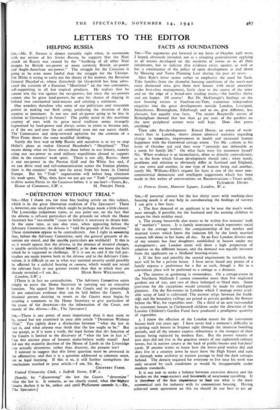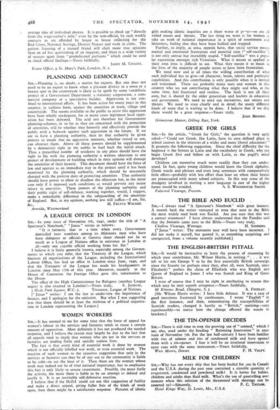Sm,—If personal contact for the last thirty years with working-class
housing needs is of any help in corroborating the findings of surveys I can give a few facts.
I. The first demand of an applicant is to be near the man's work, near enough, if possible, for the husband and the earning children to return for their midday meaL 2. The young housewife also wants to be within five minutes' walk of " mother's " house.. It is family intercourse which represents social life to the average worker; the companionship of her mother and married sisters which limits the isolation felt by the lately married woman left- alone in her home all day. In an East London district one of my tenants has four daughters established in houses under my management ; any London street will show a high proportion of relatives in the different houses, and the demand was equally insistent from the applicants on a Midland housing-estate.
3. If the first and possibly the second requirement be satisfied, the next will be for a private house. I have never heard any parent of a family express a preference for a flat as such, though a flat in a convenient place will be preferred to a cottage at a distance.
4. The interest in gardening is tremendous. On a cottage-estate in the Northern Midlands 1 cannot remember more than five neglected gardens out of 500, and two of these belonged to blind men. Some provision for the exceptions would certainly be made by intelligent planners. On the flat-estates in London which I manage every avail- able scrap of land is cultivated. The narrow strips between the build- ings and the boundary railings are prized as private gardens, for flowers before the War, for vegetables now. On a third of an acre surrounded by tenement houses in Clerkenwell children under the direction of the London Children's Garden Fund have produced a prodigious quantity of vegetables.
5. I know the affection of the London tenant for the convenient houses built too years ago. I have never had a moment's difficulty in re-letting such houses in Stepney right through the intensive bombing periods, and all the tenants express abhorrence at the orospect of their houses being replaced by modern flats. But the poorer tenants of past days did not live in the gracious streets of our eighteenth-century towns, but in narrow courts at the back of public-houses and butchers' yards. If anyone wants to know how the lower-paid worker did and does live in a country town he must leave the High Street and turn in through some archway or narrow passage to find the dark cottages behind. The density required for everyone to live near his work was only secured by such conditions as would be insupportable under modern standards.
It is our task to strike a balance between excessive density and the burden on the woge-carners and housawife of wearisome travelling. It
is therefore- of the first importance to find- out what is the most economical unit for industry with its' concomitant housing. Having achieved some agreement on this we should do our best to get an average idea of individual desires. It is possible to check up " directly from the wage-earner's wife," even by the non-official, by such weekly contacts as are afforded by house to house collecting for the Red Cross, National Savings, District Nurses and work in clubs. The patient listening of a trusted friend will elicit more true opinions than an ad hoc questioning of an inquirer, and there is a wide variety of sources apart from " prededicated partisans " which could be used to check official findings.—Yours faithfully, JANET M. Urcorr.
Estate Office, 9 St. Mary's Path, London, N. i.























 Previous page
Previous page